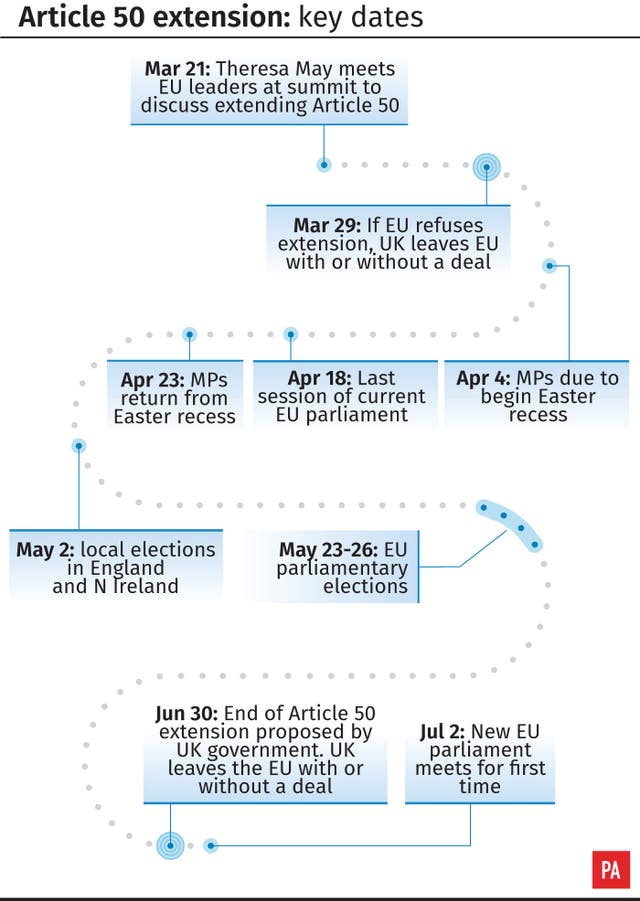May facing Brexit backlash at home as she heads to Brussels to seek more time
Jeremy Hunt said the Brexit process has “sapped our national confidence”.

Theresa May is facing a backlash from MPs as she heads to Brussels to appeal to EU leaders to grant her a delay to Brexit, amid warnings of “extreme unpredictability” if the impasse is not resolved.
The Prime Minister’s Downing Street statement, in which she blamed MPs for failing to implement the result of the 2016 EU referendum and told frustrated voters “I am on your side”, was described as a “low blow” by one former Tory minister.
No 10 defended her comments, saying they had been intended as a “message to the public” to explain why she had decided to seek an extension to the Article 50 withdrawal process.
Jeremy Corbyn was also under fire after pulling out of a meeting between Mrs May and opposition party leaders because party defectors who are now members of the Independent Group turned up.
The behaviour of the Labour leader, who was also heading to Brussels on Thursday to hold talks with EU Brexit negotiator Michel Barnier, was described by one of their number – Chuka Umunna – as “juvenile” at a time of national crisis.
With just eight days before the UK is due to leave the EU, the Prime Minister will make the case for extending the Article 50 withdrawal process to June 30 at a Brussels summit on Thursday.
Ahead of the meeting, European Council president Donald Tusk said a “short” delay should be possible – but only if MPs finally back her deal before the deadline day on March 29.
With fears in Brussels growing that the UK is heading for a no-deal break, he said he would not hesitate to call an emergency summit next week if that proved necessary.
German Chancellor Angela Merkel has also said she will work “until the last hour” to try and ensure that Britain does not leave the European Union without a deal.
Speaking to German politicians ahead of the summit, Mrs Merkel stressed “the most important emergency measures” are in place in her country to handle no-deal, but she still hopes to avoid a crisis.
She added: “We will, despite these measures we have taken, work until the last day — I will say until the last hour — to ensure that this emergency planning doesn’t come into effect.
“We will do everything in the remaining, admittedly few, days to achieve an orderly, joint solution.”
The Prime Minister will hold talks with French President Emmanuel Macron – seen as the most likely opponent to her request for more time – ahead of the main summit.
Mrs May formally made the request for an extension to the end of June in a letter to Mr Tusk on Wednesday.
The Prime Minister had previously indicated she would seek a longer delay after her deal went down to a 149-vote defeat in last week’s second “meaningful vote”.
However, she reportedly backed down after the threat of Cabinet resignations by Brexiteer ministers, who feared it could spell the end of their hopes of leaving the EU.

Foreign Secretary Jeremy Hunt said Britain would be faced with three options if Mrs May’s deal is defeated again next week: revoke Article 50; leave without a deal; or, he said, a longer extension could be granted at an emergency EU summit, but with “onerous conditions”.
“The choice that we have now is one of resolving this issue or extreme unpredictability,” he warned.
Mr Hunt sought to defend the Prime Minister’s statement, saying she was under “extraordinary pressure” and feels a “sense of frustration” – and said MPs have a “special responsibility” in a hung Parliament.
“She is absolutely determined to deliver what people voted for and I think… the Brexit process has sapped our national confidence and we need to remember now what we’re capable of as a country.”
A No 10 spokeswoman acknowledged Mrs May is facing some “extraordinarily difficult challenges”, but said she is working “tirelessly” to get her deal “over the line”.
In Brussels on Wednesday, Mr Tusk said the question of how long an extension the remaining EU 27 were prepared to grant “remains open”.
But European Commission president Jean-Claude Juncker warned Britain would have to leave by May 23 if it did not want to hold elections to the European Parliament – which start on that date – something Mrs May said she is determined to avoid.
Amid exasperation at the political deadlock in London, German foreign minister Heiko Maas said that if they were to extend the deadline, “then we would like to know: Why, why, why?”
France’s foreign minister, Jean-Yves Le Drian, said Mrs May would need to convince EU leaders that any delay was to “finalise the ratification of the deal already negotiated” and that it “won’t be renegotiated”.
With Mrs May struggling to build a majority to back her deal when she brings it back to the Commons for a third time, she made an extraordinary attempt to appeal over the heads of MPs to the public to back her.
In a televised address on Wednesday, she blamed MPs for failing to implement the result of the 2016 EU referendum, and told frustrated voters: “I am on your side.”
While she said she would “work night and day” to secure support for her deal, her comments infuriated many of those MPs she needs to win over.
Pro-EU Tory Sam Gyimah, who quit as a minister over her deal, described her remarks as “toxic”.
“Resorting to the ‘blame game’ as the PM is doing is a low blow,” he said.
“Democracy loses when a PM who has set herself against the House of Commons then blames MPs for doing their job.”
Anna Soubry, who quit the Tories to join the breakaway Independent Group, described it as the “most dishonest and divisive statement from any Prime Minister”.





